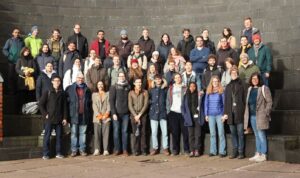Machine learning interatomic potentials (ML-IPs) have now established themselves as a key technique in atomistic modeling. They allow the simulation of many diverse types of systems, from the molecular to the solid state, at the accuracy of highly sophisticated electronic structure methods but at a greatly reduced cost. While the general methodology of training and validating a machine learning potential has been well established, many codes and integrated software applications exist to perform these tasks. Since many of these come with a high entry barrier, there is still a need to educate young and early-career researchers in these tasks, as well as provide a pathway to enter the field and make valuable contributions for researchers who have promising ideas that could benefit from the application of ML-IPs.
All posts by maxdveit
Report on the “ML-IP 2021” workshop (Young and Early-career Researchers’ Tutorial on Machine Learning Interatomic Potentials)
Machine learning potentials have now established themselves as a method of choice in many atomistic simulation projects. This tutorial workshop was aimed at young and early-career researchers who are interested in using machine learning potentials in their work, but are unsure of where to start or of how feasible the proposed application would be.
While the field continues to produce new theoretical and methodological advances, there is now a large class of systems that can be treated with existing, established methods. The main issues now for new researchers entering the field are, first, choosing between the many different machine learning methods (and correspondingly many software packages) available, and second, learning about simulation workflows and best practices that are often undocumented, unwritten “common knowledge”.
The workshop was designed with two main aims: First, to give these researchers a solid introduction in the basic scientific techniques of designing, fitting, and validating a machine learning potential for a new system. Second, to provide a platform for young researchers interested in using machine learning potentials in their work to connect to those involved in developing methods for machine learning potentials, in order to accelerate the adoption of machine learning techniques in the wider atomistic simulation community. Continue reading Report on the “ML-IP 2021” workshop (Young and Early-career Researchers’ Tutorial on Machine Learning Interatomic Potentials)

